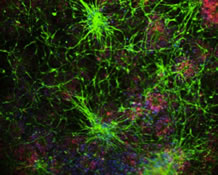Columbia University
Irving Medical Center
Neurological Institute
710 West 168th Street, 3rd floor
(212) 305-1818
Research
Frontotemporal Lobar Degeneration and Related Disorders
The Taub Institute has an active research program centered around disorders of Frontotemporal Lobar Degeneration (FTLD), including behavioral variant Frontotemporal Dementia (bvFTD), Primary Progressive Aphasia (PPA), Frontotemporal Dementia-Amyotrophic Lateral Sclerosis (FTD-ALS), Progressive Supranuclear Palsy (PSP), and Corticobasal Syndrome (CBS). The program is led by Dr. Edward Huey, Jill Goldman, and Dr. Stephanie Cosentino. Patients with FTLD and related disorders may be referred to research after being evaluated at the Neurology Aging and Dementia practice, which also includes genetic counseling / testing services and caregiver support groups.
Our research is focused on several areas including: identifying the genetic bases of FTLD and related disorders, characterizing the earliest changes in thinking and behavior that can occur with these disorders, learning about the functioning of the healthy brain by examining patients with frontal lobe disorders, and exploring treatments for FTLD and related disorders.
In addition, we are participants in 2 large, national multi-center consortia studies that seek to collect longitudinal data and biological samples to develop clinical trials biomarkers in sporadic and familial forms of FTLD.
Genetics
We were the first to report that TDP-43 mutations can result in Corticobasal Syndrome and possible associations between mutations in GRN and schizophrenia. We have also published reports that have described the effects of BDNF genotype on recovery from injury to the frontal lobes, as well as an algorithm for clinical genetic testing in patients with FTLD. We have investigated and reported on the early psychiatric symptoms and neuropsychological profile of MAPT-linked familial FTLD.
Brain function
We have published several reports on cognitive changes, and the lack of awareness of symptoms, called anosognosia, in patients with FTLD and related disorders. We have explored the neuroanatomical basis of other symptoms of FTLD including apathy, inappropriate behaviors, apraxia, executive dysfunction, sexual symptoms, and semantic knowledge. We have examined structural and functional neuroanatomical changes and tested the utility of tau PET imaging in early MAPT-linked FTLD.
Treatment
We are currently administering two clinical trials targeting behavioral symptoms in FTLD. Please refer to the clinical trials tab for further information.

